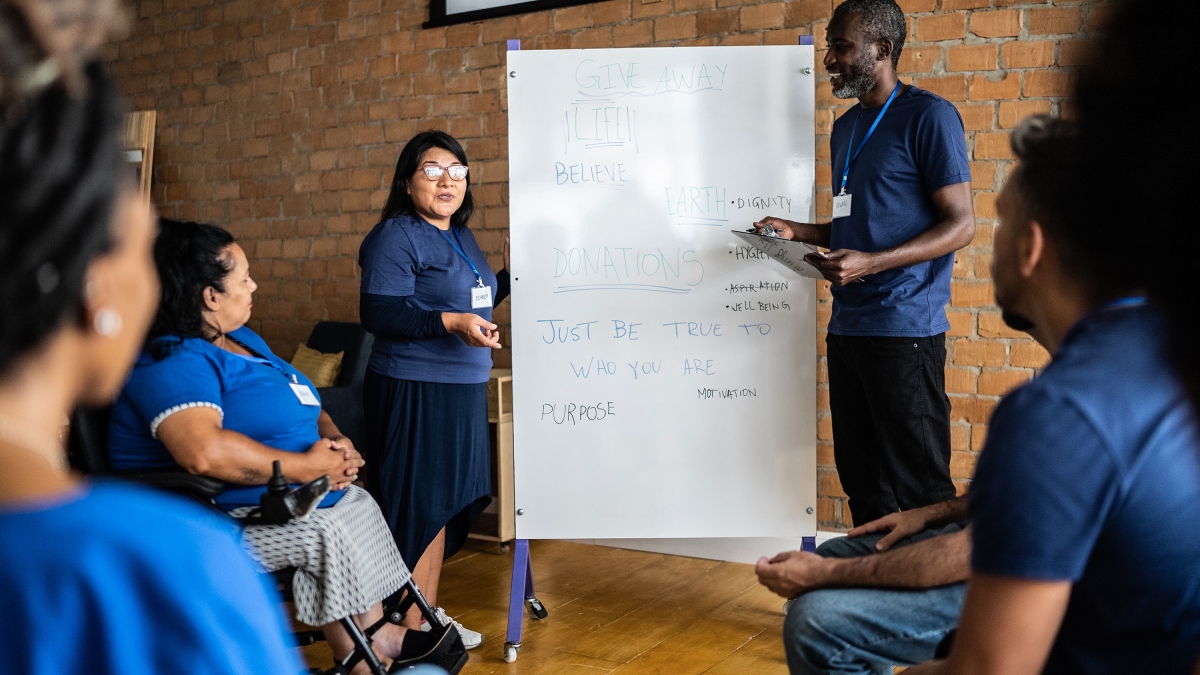College of Health Solutions receives $3M grant to help train community health workers

The grant from the Health Resources and Services Administration will help train community health workers in underserved communities throughout Arizona. Photo from iStock/Getty images.
The College of Health Solutions has launched a community health worker training program (CHW-TP) to improve community access to health-promoting services throughout Arizona.
The online program, funded by a $3 million grant from the Health Resources and Services Administration, will be available through Arizona State University Learning Enterprise and is paired with internship and apprenticeship opportunities in various communities throughout Maricopa County and the state. Participants who successfully complete the program will be eligible for voluntary certification through the Arizona Department of Health Services.
There are multiple benefits to training people who already live and are heavily invested in these areas, according to Mindy McEntee, College of Health Solutions assistant professor and project director. It develops better engagement with the program and a better understanding of how to best meet the local needs of the community, which contributes to moving the needle toward better health outcomes and improved quality of life.
“Community health workers, community health representatives, promotores de salud and many other related titles grouped under the 'CHW' umbrella have a long-standing history of connecting underserved communities and the health care system throughout Arizona,” McEntee said. “By having a close understanding of a community’s culture, language and social dynamics, these frontline public health workers provide education, support and advocacy that contributes to improving health outcomes, reducing disparities and building overall healthier communities.”
The program has buy-in from community partners including Valleywise Health, Valley of the Sun YMCA, Creighton Community Foundation, Mercy Care, Terros Health, Advance Community (formerly Esperança), Unlimited Potential and Phoenix Area Indian Health Service.
Rear Adm. Michael Weahkee of Phoenix Area Indian Health Service said programs that put more trained health workers in communities that need them are invaluable.
“American Indian tribal communities are often located in some of the most rural and remote parts of our country,” Weahkee said. “Recruitment of licensed health care professionals to provide services for tribal communities is a challenge, and we have found one of the best strategies to help confront this challenge to be the investment in training of our own tribal members as community health workers.”
Program offers real world training
The internship and apprenticeship opportunities are in connection with the community partners. Learners are matched with on-the-job training to round out their experiences and give them more specialized knowledge, whether that be with a specific population or certain health conditions.
Unique aspects of the online curriculum include use of peer groups for collaborative assignments, experiential learning activities and real-time monthly mentorship meetings.
“By working with multiple community partners, we hope to continue to expand the reach of CHWs, help to establish connections that can lead to long-term employment and increased satisfaction among CHWs, and to use our network to facilitate dissemination and implementation strategies,” McEntee said. “There is a lot of work being done in this area by separate parties; one of our goals is to strengthen the network across the state to share what's been successful to avoid having to recreate the wheel.”
And according to Weahkee, there are benefits beyond additional health workers.
“The new ASU CHW-TP provides a tremendous opportunity for tribal communities in Arizona to strengthen their capacity to address the health and social conditions that disparately impact them,” Weahkee said. “This training investment also helps to address important social determinants of health in Native communities, including education access, health care access and employment opportunities.”
How to get involved
Ideal candidates will be U.S. citizens or permanent residents at least 18 years old with a high school diploma or GED. The program seeks people interested in supporting the health and wellness of their communities by gaining new skills, reskilling or upskilling into the health care workforce. Since the program is online, a reliable high-speed internet connection is necessary.
Full-time participants in the program will receive a $7,500 stipend, with $1,000 of those funds going toward program costs.
View the application here — there is a July 31 deadline for starting the online curriculum in August. Those interested in an apprenticeship pathway are encouraged to apply as soon as possible, as these positions are limited. The program will accept applications on a rolling basis, with a new cohort starting each spring (January) and fall (August) semester.
Community organizations interested in learning more about partnering with the program are encouraged to reach out the project director, Mindy McEntee, at mindy.mcentee@asu.edu.
More Health and medicine

Making medicine side-effect free
Many drugs that address medical conditions can come with serious side effects. In drug commercials, the litany of potential side…

Diagnostic research happening at ASU focused on detecting diseases earlier to save lives
It was one of America’s founding fathers, Benjamin Franklin, who may have foreshadowed today’s health care innovation when he…

Fighting the fungus among us
It starts with a spore.When inhaled, spores of the coccidioides fungus can cause coccidioidomycosis — better known as valley…

